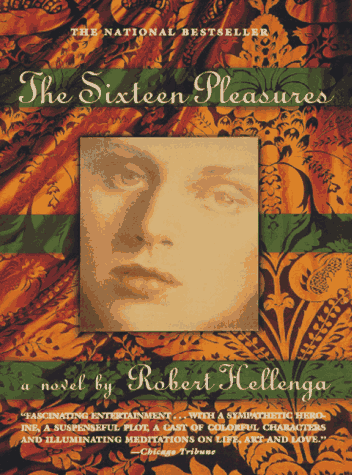The Sixteen Pleasures
Robert Hellenga
Fiction (modern historical)
Review posted: 7/20/03
In 1966 the banks of the Arno flooded the city of Florence, endangering some of the city's greatest treasures of art and literature. Hundreds of volunteers rushed from all corners of the world to help preserve them and restore them. The Italians called the volunteers "Mud Angels" because they rushed to aid them despite the filth. The Sixteen Pleasures tells the story of Margot Harrington, who cast her lot with the rest of the "Mud Angels" and found herself while plowing through the mud.
Margot is a book conservator who feels the call to save the rare works now endangered by flood waters that have only begun to ebb, so she wipes out her savings and heads to Italy.
This book is a journey. It is a journey for Margot, who is something of an innocent, and a journey for the reader as it draws you in and awakens you to her innocence and to her loss of innocence.
Margot meets a man, Dottor Postiglione, who helps her find a place at a convent where she works restoring books, teaching the nuns how to save them, and learning from them and their surprisingly worldly abbess, the dottor's cousin.

While working there she discovers an unique volume of
pornography, The Sixteen Pleasures. Bound together with a prayer book it is the only surviving copy of this book that so shocked the world the pope had ordered every copy burned when it had first appeared centuries before.
Margot, who has always doubted her own sensuality is both shocked and enthralled by the book. She and her now lover Dottor Postiglione, make plans to sell it and donate the proceeds to the convent to keep it autonomous and out of the hands of a grasping bishop.
Margot restores the book lovingly and carefully, becoming almost obsessed, her fortunes bound up with the fate of that volume.
During the course of the novel Margot becomes increasingly confident as she falls in and out of love, her understanding of the book increasing her understanding not of sex, but of life itself.
The Sixteen Pleasures, like Margot herself, seems to grow in confidence as it proceeds. Hellenga's attempt to take on the view and voice of a woman are uncertain at first, almost hesitant, until the end of the novel, where I had to put it down and make sure that it was, indeed, written by a man.
And despite the subject matter of The Sixteen Pleasures that comes into Margot's possession, the book itself is not about sex. Yes, there are love scenes. They are neither excessive nor vulgar, but handled, like most of the book, with a deft touch by Robert Hellenga.
This is a lyrical book. Beautifully written and vividly created. Hellenga effectively captures the details of day to day living without bogging the reader down in them. Details about Margot's work are accurate but not overly technical and the rhythm is even, rarely jarred from its smoothly prosaic tone.
Hellenga does, occasionally change the point of view from Margot's first person to that of the third person narrator. The first two times it happened it was, admittedly disorienting, but later occurrences are smoother, although perhaps I just got used to them.
The Sixteen Pleasures is a gift. A gift from Margot to herself. From Hellenga to the reader, and a book I want to give as a gift, to press into another's hands and say "read it."
Contact the author
These pages are produced by and copyright to Carrie E. Byrd.
|




